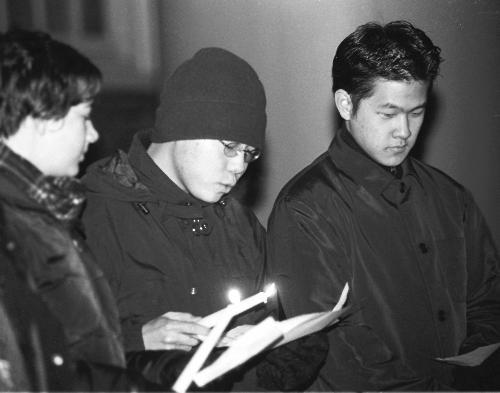
News
Summers Will Not Finish Semester of Teaching as Harvard Investigates Epstein Ties

News
Harvard College Students Report Favoring Divestment from Israel in HUA Survey

News
‘He Should Resign’: Harvard Undergrads Take Hard Line Against Summers Over Epstein Scandal

News
Harvard To Launch New Investigation Into Epstein’s Ties to Summers, Other University Affiliates

News
Harvard Students To Vote on Divestment From Israel in Inaugural HUA Election Survey
Vigil Remembers Japanese Internment

On the 60th anniversary of Executive Order 9012—the mandate that paved the way for the internment of Japanese-Americans during World War II—about 40 students braved the cold and slushy weather last night to commemorate the internment with a candlelight vigil.
The order, given on March 18, 1942, by President Franklin D. Roosevelt, Class of 1904, established the War Relocation Authority that administered the internment camps.
Last night, students held white candles and recited poems written by Japanese internees in front of Memorial Church.
According to the fact sheet distributed by the event organizers, the U.S. government forcibly removed 120,000 Japanese-Americans who lived along the Pacific coast from their homes.
Over two-thirds of those placed in camps were U.S. citizens.
Two years after the last of the camps was closed, the Japanese American Evacuation Claims Act of 1948 paid former internees a total of $38 million—less than 10 cents for every dollar lost, according to the fact sheet.
William L. “Lonnie” Everson ’02, who organized the vigil, said the bad weather was “almost fitting in a way.”
“Nothing can compare to what the internees have suffered,” Everson said.
Masafumi J. Hoshino ’02, another organizer of the event, said marking the anniversary was particularly important this year in light of acts of violence and discrimination against minority groups in the wake of Sept. 11.
“We couldn’t ignore the fact that the events of racial profiling and discrimination are repeating themselves today,” Hoshino said.
Hoshino and Everson are members of both the Harvard-Radcliffe Japan Society and the Asian American Brotherhood, which co-sponsored the event.
Students who attended last night’s vigil said it was very moving.
Lisa M. Watanabe ’02, whose four grandparents lived in the internment camps, said she found the poems especially touching—breaking down in tears at one point.
“I’m going to call my grandparents tonight,” Watanabe said after the vigil.
The vigil also attracted attention of some non-Japanese students, including Felicia M. Sonmez ’04, who is a member of the Japan Society because said she is interested in Japanese culture.
“Americans do not realize that our country has done horrible things based on race and paranoia,” Sonmez said.
A discussion on the internment was held at Loker Commons after the vigil.
Want to keep up with breaking news? Subscribe to our email newsletter.
